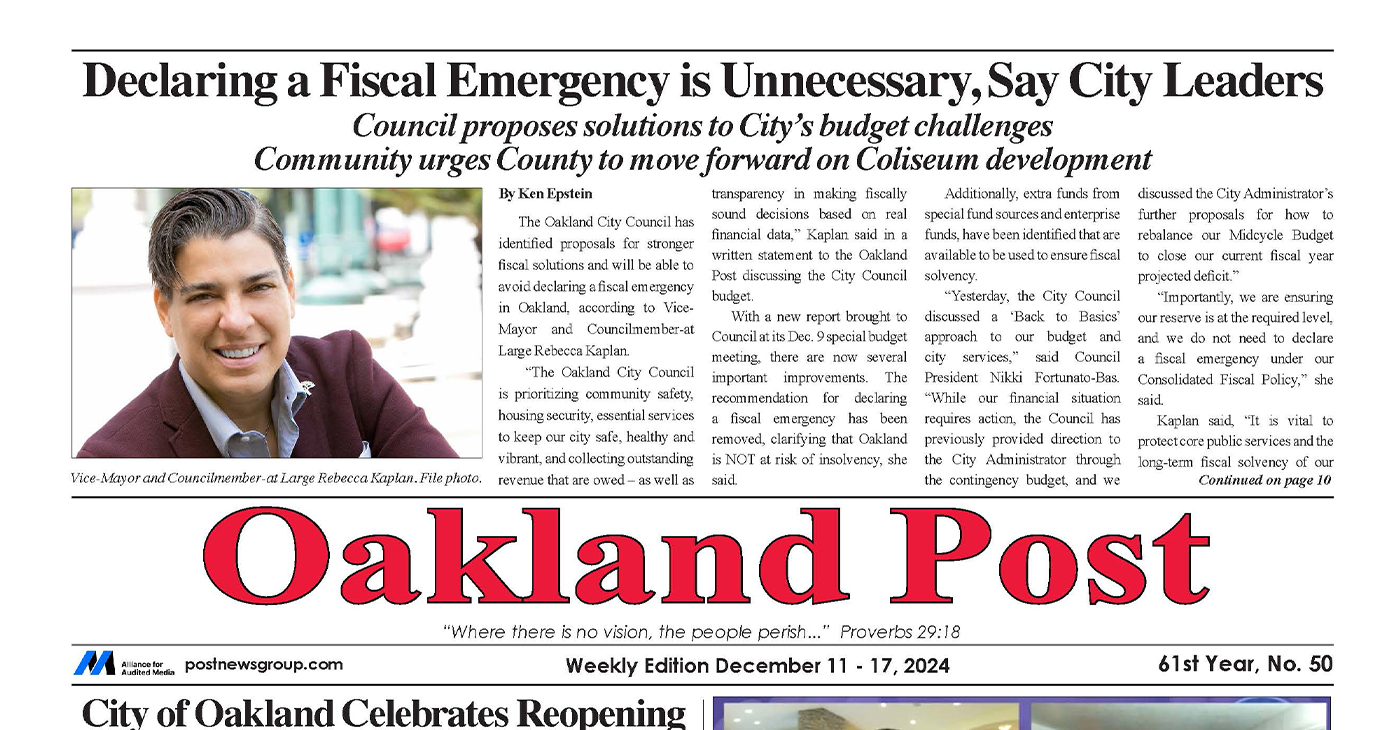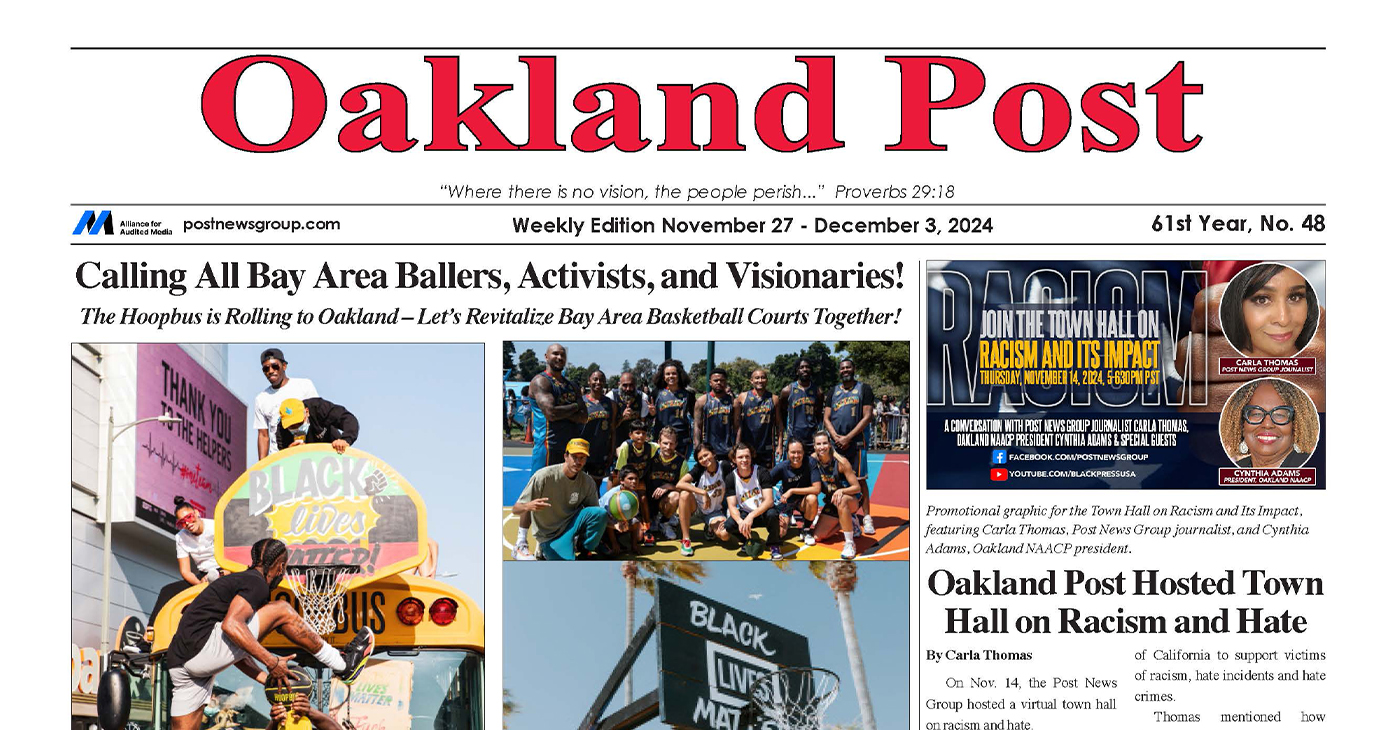Economics
Port of Oakland Set to Pass Groundbreaking Jobs Policy

After 21 months of negotiations with the local community, the Port of Oakland Board of Commissioners voted Thursday is set to approve a “Good Jobs” policy on the Port’s new state-of-the-art warehousing complex.
Community groups say this be one of the most equitable job policies in the warehousing and logistics industry, setting a standard for online retailers like Amazon. And because it provides pathways to good jobs for primarily low-income people of color, it begins to curb economic inequality and structural racism.
As the Post went to press this week, it was unclear whether the Port Commission would vote on the lease at their Thursday meeting or postpone the decision.
Calling for postponement was a group of regulators, local, regional and national environmental advocates who requested the commission delay accepting this lease until port staff engages in good faith negotiating on the environmental elements of the new warehouse. The environmental group says it is committed to jobs but just as committed to clean air and healthy neighborhoods in West and East Oakland and the 880 corridor.
So far, the port has agreed to discuss the group’s environmental concerned but never schedules meetings, according to the environmentalists.
The warehouse development sits on the Port’s side of the former Oakland Army Base – a massive, incredibly valuable, publicly-owned property. OaklandWorks and Revive Oakland, a coalition of community, labor, and faith groups, led the negotiations with the Port and won an even stronger agreement than its 2012 deal on the city-owned part of the Army Base.
With the rise of online retailers like Amazon, jobs in warehousing and logistics – or “goods movement” – have become increasingly common. These jobs are typically low-paying and often part-time, temporary, and/or subcontracted.
The new port warehouse jobs policy establishes a model that other cities could follow, including living wages; limitations on the use of temporary agencies; equal protections for subcontracted workers; and one of the strongest Ban the Box policies in the country.
“As the [ort becomes a gateway for the booming tech, online, and app-centric economy, we are creating policies that lift low-income workers and communities of color,” said Jahmese Myres, Revive Oakland Coalition Director.
“With racism and economic inequality on the rise during the Trump Era, we are helping to ensure that low-income people of color have good jobs and can stay in their homes,” she said.
Cities across the country recently submitted proposals to lure Amazon to build their new headquarters in their areas. The bidding war outlined community giveaways rather than what the company could do for cities struggling to create living wage jobs with benefits that would allow workers to afford housing and provide for their families.
This comes at a time when low-income communities of color are increasingly being pushed out of many urban areas due to the high cost of housing and the lack of opportunity for formerly incarcerated workers.
However, the Port agreement can serve as a model for how community driven negotiations result in better outcomes for workers and residents, particularly people of color who have been shut out of good jobs.
In addition to living wages, the agreement would mandate local hire, equal protections for subcontracted workers, and one of the strongest “Ban the Box” policies in the country. The latter curtails discrimination against the formerly incarcerated, who are disproportionately people of color.
“With one of the strongest Ban the Box policies in the country, the Army Base redevelopment is standing against discrimination, employment inequality, and the racial injustices that we face daily,” said Saabir Lockett, a formerly incarcerated Oakland resident.
“Policies like this create a more sustainable relationship between employers and local residents, giving more of us the chance to provide for our families with dignity,” said Lockett.
Activism
Oakland Post: Week of December 11 – 17, 2024
The printed Weekly Edition of the Oakland Post: Week of December 11 – 17, 2024

To enlarge your view of this issue, use the slider, magnifying glass icon or full page icon in the lower right corner of the browser window. ![]()
Activism
Oakland Post: Week of December 4 – 10, 2024
The printed Weekly Edition of the Oakland Post: Week of December 4 – 10, 2024, 2024

To enlarge your view of this issue, use the slider, magnifying glass icon or full page icon in the lower right corner of the browser window. ![]()
Activism
Oakland Post: Week of November 27 – December 3, 2024
The printed Weekly Edition of the Oakland Post: Week of November 27 – December 3, 2024, 2024

To enlarge your view of this issue, use the slider, magnifying glass icon or full page icon in the lower right corner of the browser window. ![]()
-

 Activism4 weeks ago
Activism4 weeks agoOakland Post: Week of November 20 – 26, 2024
-

 California Black Media3 weeks ago
California Black Media3 weeks agoCalifornia to Offer $43.7 Million in Federal Grants to Combat Hate Crimes
-

 Activism4 weeks ago
Activism4 weeks agoAn Inside Look into How San Francisco Analyzes Homeless Encampments
-

 Black History3 weeks ago
Black History3 weeks agoEmeline King: A Trailblazer in the Automotive Industry
-

 California Black Media3 weeks ago
California Black Media3 weeks agoCalifornia Department of Aging Offers Free Resources for Family Caregivers in November
-

 California Black Media3 weeks ago
California Black Media3 weeks agoGov. Newsom Goes to Washington to Advocate for California Priorities
-

 Activism3 weeks ago
Activism3 weeks agoOCCUR Hosts “Faith Forward” Conference in Oakland
-

 #NNPA BlackPress4 weeks ago
#NNPA BlackPress4 weeks agoPRESS ROOM: Clyburn, Pressley, Scanlon, Colleagues Urge Biden to Use Clemency Power to Address Mass Incarceration Before Leaving Office





















































